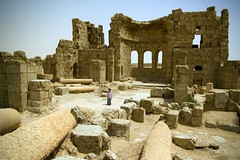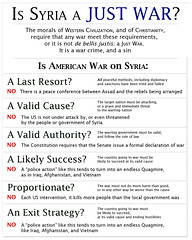I spent my free time this morning reviewing the transcript from the Senate Foreign Relations Committee hearing. Why would I do that? Because the conversation lasted more than 5 minutes, and that’s all you’ll get from the best of coverage from practically every news agency out there — unless you read the transcripts published online.
I was compelled to do so because I heard a paradox in the presentation. President Obama says that we have to do this or risk losing credibility. But we lose some credibility because of a simple fact: We’re bombing the people of Syria because their leader bombed the people of Syria.
That paradox means that we need to have a very clear understanding of what it is that we are doing.Secretary of State John Kerry and Secretary of Defense Charles Hagel noted that we have three main goals: To hold the Assad regime accountable, degrade its ability to carry out these kinds of chemical attacks, and deter the regime from further use of chemical weapons.
The caveat is that it must be done without putting American Boots on the ground. No ground war. No foot soldiers.
I’m convinced that we have an obligation to act. And here is the simplicity of my reasoning.
We Said We Would
In the past sixty years, the United States of America has formally denounced chemical weaponry several times. We signed a treaty in 1993 to ban chemical weapons. Syria was a signatory. We signed a treaty in 1925 called the Geneva Protocols. Syria was a signatory then as well.
I agree with the Senator when he said:
And the truth is that through all of World War II, through Vietnam, through Korea, through both Gulf Wars, through Afghanistan, through Iraq, the combatants in those efforts have never resorted to this use. So I think that it’s clear, with those two prior usages that I referred to, that we would be opening Pandora’s box with respect to a whole set of dangerous consequences as a result of the United States not keeping its word. And it would make our life very, very difficult with respect to North Korea and Iran.
The Intel is Solid
When we went to war in Iraq, the intel was touted as solid. It was not. The intel was ramped up and the curveball got past us.
According to State and Defense, we have the following data points:
1) Independently verified chemistry confirms Sarin gas was used.
2) The geography of the attacks is unmistakable. Only insurgent areas were attacked.
3) And there were verified signals intelligence of Assad’s people worrying over being discovered. Kerry said, “With high confidence, our intelligence community tells us that after the strike the regime issued orders to stop and then fretted openly, we know, about the possibility of U.N. inspectors discovering evidence.”
But Is It Right?
Even with all that data, is it enough?
Under most of the Just War theories that I know, we’re on thin ice. You can read more about Just War theory in this well-presented article by Jeff McMahan. You can dig into the classics with a quick search of the Internet for St. Augustine and Thomas Aquinas and their thoughts on what makes for a Just War.
According to most Just War theorists, we lack the just war requirements of last resort, discrimination, proportionality and legitimate authority.
There are other options besides lobbing cruise missiles, so this would not be a last resort. While we can pinpoint a target and fly a missile through an open window or down a chimney, the ability to discriminate between active soldiers and passive civilians is still questionable.
We can’t really argue proportionality until we know the scope of the attack, but the data suggests a reduction in capacity to wage chemical war. That means that some hard targets will include weaponry and vehicles for delivery. That would fit.
The ultimate question is, “Does the United States have legitimate authority?”
That all depends on who it is that you are asking.
The Ultimate Question
If we are wrong in firing on Syria and wrong for not taking action to protect innocents, we have a paradox of evil. As with most situations in the world, we’re living in a gray area, not a clear choice between black and white.
If it is as simple as choosing the lesser of two evils, then I think we should err on the side of preventing further attacks and sending a clear message to those who would destroy innocent human life.
I ask you to join me in praying for the end of wars to be hastened.
UPDATE
Several entities and agencies of The United Methodist Church have issued statements on the Syrian Conflict. You can read more about those statements and the dialogue that ensued at the United Methodist Reporter.





















Recent Comments